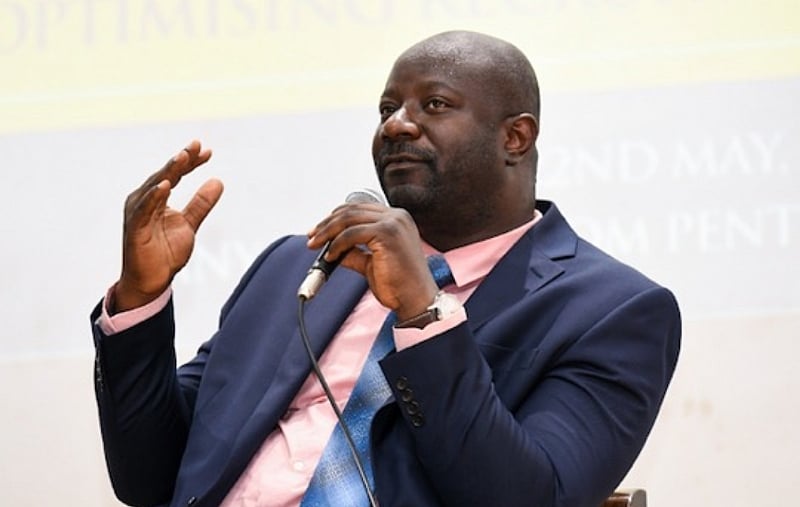The debate surrounding the persistent environmental degradation caused by illegal mining, commonly known as galamsey, in Ghana has sparked various proposed solutions, with the declaration of a state of emergency being one of the most contentious. Dr. Dickson Adomako Kissi, former Member of Parliament for Anyaa Sowutuom, firmly opposes this drastic measure, arguing that a more targeted and effective approach lies in identifying and prosecuting the financiers who bankroll these illegal operations. He believes that declaring a state of emergency is an unnecessarily broad stroke that could infringe on civil liberties and disrupt legitimate economic activities, while failing to address the root cause of the problem. Instead, Dr. Kissi advocates for a focused and intelligence-driven investigation into the financial networks underpinning galamsey, asserting that these financiers are often known within security circles and their apprehension is achievable with concerted effort.
Dr. Kissi’s argument centers on the belief that following the money trail is the most effective way to dismantle the galamsey infrastructure. He contends that the individuals who provide the capital for equipment, logistics, and operational expenses are the true kingpins of this illicit industry. By targeting these individuals, law enforcement can cripple the operations on the ground, effectively cutting off the lifeblood of galamsey. He suggests that tracing the connections between local operators and their financial backers in urban centers, like Accra, is a feasible task for law enforcement agencies. He emphasizes that this does not require exceptionally complex investigative techniques, implying a lack of political will rather than a lack of capacity within the security apparatus. This pointed critique suggests a possible complicity or deliberate inaction within the system, hindering the effective prosecution of the individuals responsible for funding galamsey activities.
Furthermore, Dr. Kissi alleges the involvement of actors from both major political parties, the National Democratic Congress (NDC) and the New Patriotic Party (NPP), in illegal mining. This accusation throws a shadow of political expediency over the issue, suggesting that partisan interests may be hindering genuine efforts to combat galamsey. While acknowledging that the previous NPP administration, of which he was a part, did not completely eradicate the problem, he criticizes what he perceives as an escalated level of environmental destruction under the current NDC administration. He asserts that the pursuit of short-term economic gains through increased gold production, regardless of its source, has taken precedence over environmental protection. This accusation implies a prioritization of immediate financial benefits over long-term ecological sustainability, a potentially damaging trade-off for the country’s future.
This prioritization of financial gains over environmental protection, according to Dr. Kissi, manifests in a “reckless” disregard for environmental consequences. The alleged surge in illegal mining activities during the past eight months, as claimed by Dr. Kissi, points towards a potential exploitation of the industry for economic gains, potentially to bolster national reserves. This focus on immediate economic benefits, he argues, overshadows the long-term repercussions of environmental damage. Such damage includes deforestation, water pollution, and soil degradation, all of which have significant and lasting impacts on human health, agricultural productivity, and biodiversity. Dr. Kissi’s concern highlights the complex interplay of economic interests and environmental protection, a dilemma often faced by developing nations.
The core of Dr. Kissi’s argument lies in his belief that addressing the financial underpinnings of galamsey is more effective than imposing a blanket state of emergency. He views a state of emergency as a heavy-handed approach with potential for abuse and unintended consequences, while failing to address the root cause of the problem. A more sustainable solution, he suggests, involves strengthening law enforcement capacity, enhancing intelligence gathering, and fostering inter-agency collaboration to effectively track and prosecute the financiers of these illegal operations. He emphasizes the importance of disrupting the financial incentives that drive galamsey, thereby dismantling the network from the top down. This approach, he argues, is more likely to achieve long-term success than a temporary and potentially disruptive state of emergency.
Therefore, Dr. Kissi’s stance underscores the necessity of a comprehensive and multi-faceted approach to combatting galamsey. This includes not only law enforcement actions targeting financiers but also addressing the socio-economic factors that drive individuals to engage in illegal mining. Creating alternative livelihood opportunities, promoting responsible mining practices, and strengthening environmental regulations are all crucial components of a sustainable solution. Ultimately, tackling the galamsey menace requires a concerted effort from all stakeholders, including government, civil society, and the mining industry itself, to ensure the protection of Ghana’s natural resources for future generations. His criticism of the alleged political involvement further emphasizes the need for transparency and accountability within the political system to ensure that the fight against galamsey is not compromised by partisan interests or individual gain.


